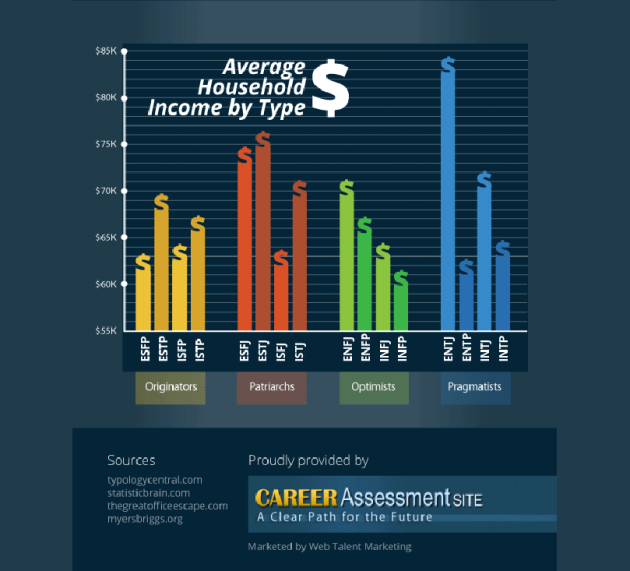Found this article. What do you think of the results of their study?
http://finance.yahoo.com/news/personality-types-most-least-amount-140826566.html
[h=1]The personality types that make the most and least amount of money[/h]By Jacquelyn Smith February 20, 2015 9:15 AM
A lot of things determine how much money you make: your level of education; the job you choose to pursue; the company you work for; your hard skills; and your ability to negotiate.
But one thing you really have no control over that affects your pay is your personality type.
According to the Myers-Brigg Type Indicator, which tests behavioral binaries, there are a total of 16 distinctive personality types.
The Career Assessment Site created an infographic that, among other things, shows the average household income for each one.
Here's a look at average pay by personality type: View gallery
.
Career Assessment Site
Individuals with the ENTJ (Extroverted, Intuitive, Thinking, Judging) type, who tend to be natural leaders, earn the most money, on average.
"They're typically short- and long-term planners who are able to read into data effectively, leading them to find patterns and creative solutions to problems," explains Jonathan Bollag, an executive coach and founder of Career Assessment site. "They put this information through a logic-based filter in order to make objective decisions. You then add their preference for extroversion that translates to them having an easier time networking and communicating with large groups of people."
These personality preferences combine to create the potential for an individual who stands out as an effective and efficient problem solver with a long-term vision.
"These people also tend to present their positions from a logical perspective, and are able to create the right connections to create leadership opportunities," Bollag says. "Not coincidentally, these leadership positions come with some of the highest possible income potential."
At the other end of the spectrum you'll find the INFP (Introverted, Intuitive, Feeling, Perceiving)Â type.
"Individuals with the INFP personality type are introverts and they tend to be less comfortable with networking and 'reaching out' in general," he says. "This may lead them to miss opportunities to make contacts that propel them to positions of higher income levels."
View gallery
.
Flickr/Wiertz Sébastien
"Individuals with the INFP personality type are introverts and they tend to be less comfortable with networking and 'reaching out' in general."And in a world where "who you know" matters more than "what you know," this can be detrimental.
These individuals also tend to be attracted to career paths that offer a lot of flexibility and freedom where their creative expression can manifest itself on their terms, Bollag says. "This is why you find that a lot of INFP's go into fields like music, arts, and creative writing," he explains. "Unfortunately for income statistics, there is a very good reason why we use the term 'starving artists' and the few examples of famous artists, novelists, and musicians that make it big are a very small percentage of the population."
Finally, he says, these individuals tend to lean on subjective analysis of situations when making decisions. "They consider the impact their decisions have on other people and aim to have harmony in their environment. While there is nothing wrong with this perspective, it may lead them to shy away from positions that force them to make hard, logic-based decisions that effect others in a negative way."
For example, an INFP may have a much harder time making a corporate level decision that lays off a thousand employees for the betterment of the company than someone who had a Thinking ("T") based personality type. "A T-based personality type may be able to justify the action, but an F-based personality type, like the INFP, may have lingering issues with such a past decision long after it has been made."
When you combine all of these aspects you find a combination that is less likely to be naturally attracted to some of the high-income career paths, Bollag adds.
He says it is important to note that these are "averages" and it does not mean that you cannot make a great living while having the INFP personality type.
"Your personality type does not dictate how good you will be at something. It only lets you know which preferences are most natural for you," Bollag explains. "What you do with that knowledge and how hard you work at your chosen career path will have the biggest impact on your income potential."
http://finance.yahoo.com/news/personality-types-most-least-amount-140826566.html

